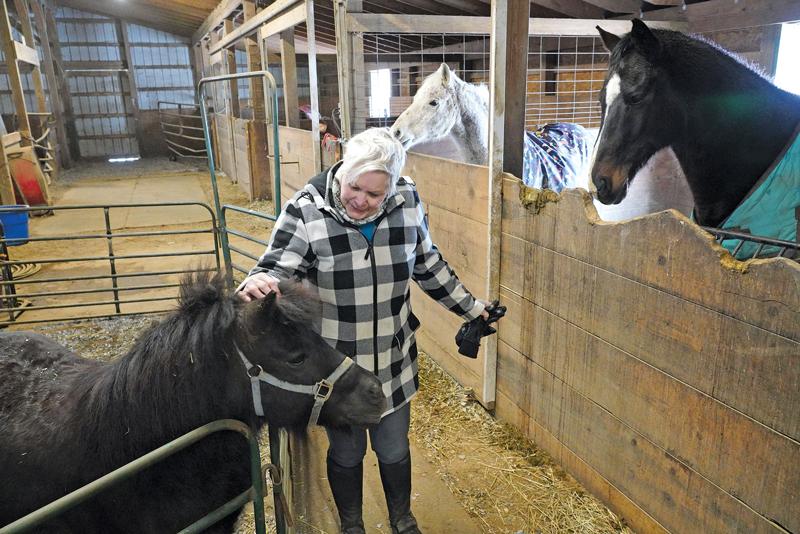Despite shocking unemployment figures, last spring and summer “animals were adopted in unheard-of numbers,” says Terry, an Ann Arbor attorney and the group’s volunteer executive director. In a typical year, the rescue might see twenty or twenty-five horses adopted; last year, sixty-three found new homes.
“Number one, people are at home more, and number two, people are looking at their phones and social media more,” Terry says–where they discover adoption postings from rescue groups.
Based at Terry’s Scio Township farm, Starry Skies was established as a 501(c)3 in the fall of 2011. Among its first rescues were a group of eleven neglected horses authorities had seized from a farm near South Lyon. Since then, between 600 and 700 horses have spent time at the facility. Almost all were adopted out to forever homes, but a few remain as sanctuary horses. Currently about thirty are in residence.
One of the primary factors in adoption is the Michigan hay crop. Horses require 5 to 8 percent of their body weight in forage every day; that’s easier on the wallet when hay is $3 to $5 per bale, after a good crop is harvested in early summer, than when it’s $8 to $10, as it was late last winter. That’s why Starry Skies is prepared for the possibility that an adopted animal may end up being returned. Fortunately, many of last year’s adopters had adequate barns and acreage to support their new friends.
Every year the rescue goes through 500 to 800 540-pound round bales and 1,500 to 2,000 eighty-pound square bales, plus thirty-five to sixty tons of grain. “The swing in those numbers is dependent on the number and sizes of the horses that we have,” Terry adds–over the years, it’s fluctuated from as few as twenty to as many as 110.
The 160-acre farm has been in Terry’s family for six generations. “I’ve lived here my whole life,” she says. Before she goes to work each day, she does the morning horse chores–feeding, watering, and administering medications. Her husband, Danny Sauls, is always at the farm making repairs, raising and baling hay, and doing chores for their own standard and mini horses, ponies, goats, potbellied pigs, chickens, and Abby, the alpaca.
Starry Skies is run by volunteers; there is no paid staff. The number of workers fluctuates according to the weather, the season, and personal circumstances. In past years there was a core number of twenty or thirty steady volunteers, including two women who’ve been arriving at 6:30 a.m. every Saturday since 2011 to feed and water the horses and muck their stalls, no matter the weather. A tightly knit group of eight to fifteen volunteers comes every Sunday morning to muck out stalls and clear the pastures and the weather sheds.
Recently the number of volunteers has increased dramatically, to fifty or eighty, and another 200 or so who come occasionally–primarily, Terry believes, because people were looking for activities that would get them out of the house. Some come for a week or two or a month, then disappear after realizing that much of the work does not involve being up close with the horses. But, Terry says, “volunteers come almost every day at an appointed time and clean the stalls.”
Besides feed, there are vet and farrier expenses to consider. “Dr. Denise Bickle of Whole Horse Veterinary Services donates her services and also provides us all of our medications at cost. That’s several thousand dollars in savings to the rescue,” Terry says with an audible sigh of relief.
Josh Pelham, the farrier, comes most Tuesdays. “We pay him, definitely not as much as he deserves, but we do pay him,” Terry says. “We have horses that are not well trained that come to us all the time, and that poor man has to struggle–leaned on, getting bit and kicked–and he still keeps putting up with us.”
The on-site trainer, Emily Roat, is a recent U-M grad. She arrived one day–with a friend who rode for the university’s equestrian team–and has been a fixture ever since. She uses Terry’s personal horses to give riding lessons and use the indoor arena; in exchange, she volunteers twenty or thirty hours a week to show horses to prospective adopters and to work with and train horses for adoption.
Last year, Roat and other volunteers worked with Sally, a mare who’d been at the rescue for nine years. Sally was feral and could rarely be caught for any reason during her whole time at Starry Skies, but Roat and a few other volunteers won her trust–and a video Roat made led to her adoption in December.
Starry Skies’ funding comes from donations and adoption fees. Terry’s family shoulders the upkeep on the barns, so the operating budget of just over $80,000 goes mainly to feed and vet and farrier expenses.
“It’s not easy, and it’s not an accident that makes this place run,” Terry says. Every night she makes a barn check just to make certain all the horses are well and quiet.
